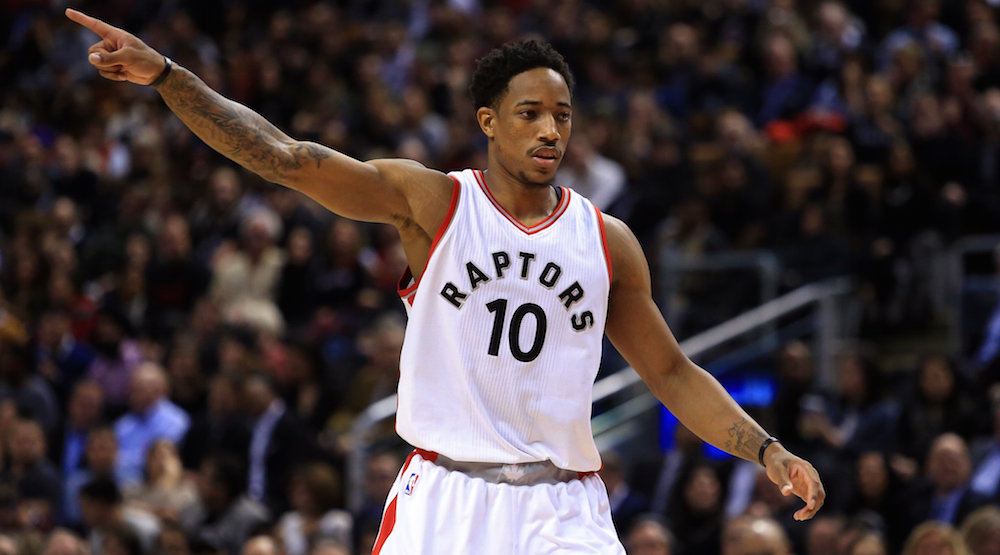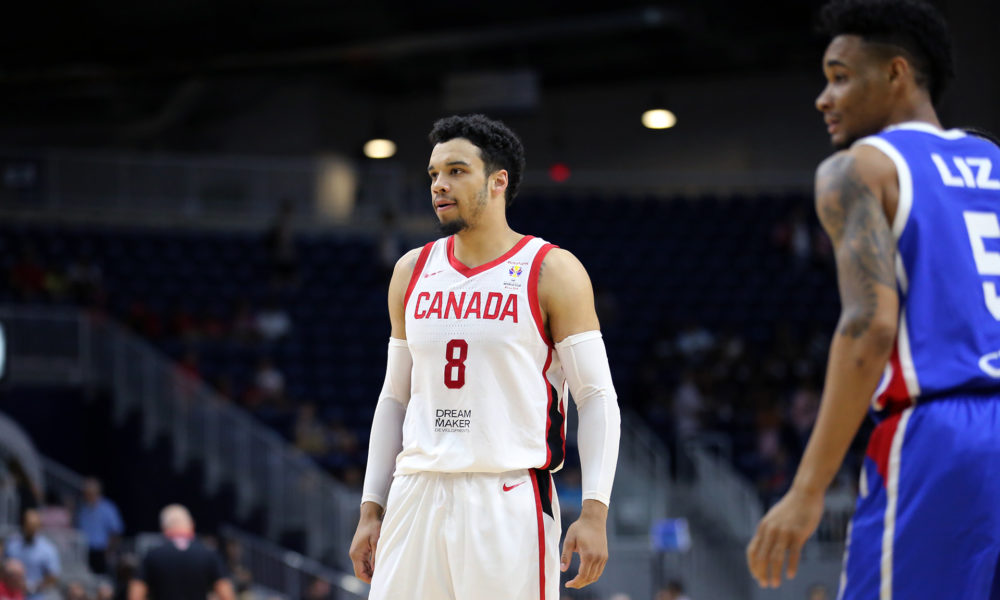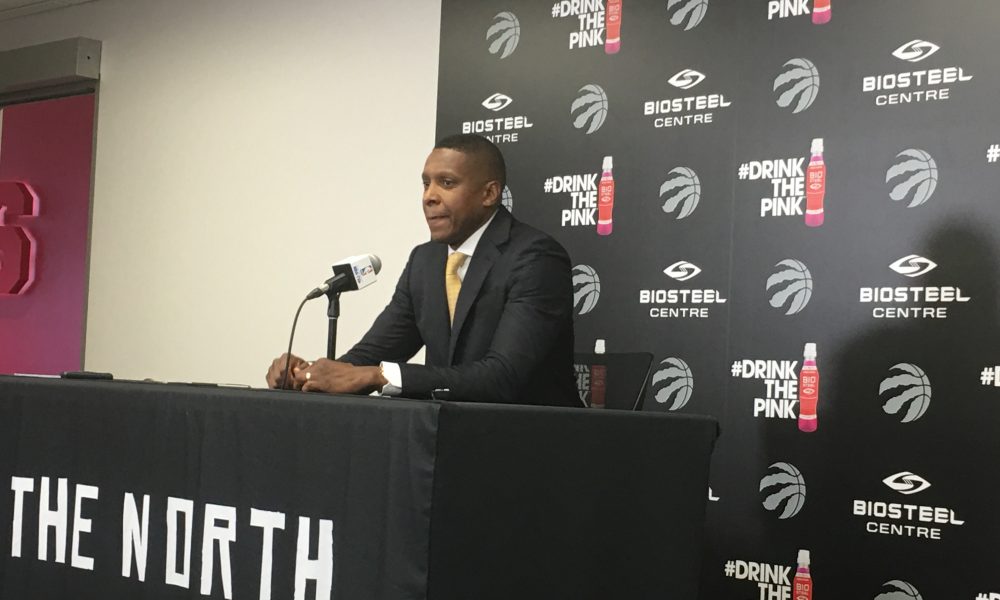Kyle Lowry sat at the table by himself, at a stage where the backdrop served as a constant reminder that someone was missing. It was Game 3 of the Toronto Raptors’ Eastern Conference Semifinal showdown with the Cleveland Cavaliers, his team having just lost in the most excruciating way.
“I’m kinda lonely, I’m really lonely right now,” Lowry said when asked about the absence of his backcourt mate DeMar DeRozan. “I am, I miss my guy.”
Some in Toronto did as well, while others were ready to crucify. In what was effectively an elimination game since no team has ever overcome an 0-3 deficit in the NBA playoffs, DeRozan shot 3-for-12 from the field, got to the line just twice, and finished a game-worst minus-23 in 28 minutes.
This was supposed to be his time and the Raptors’. Coming off a season in which he finally started catching up with the philosophy of the modern game and started shooting more threes, averaged a career-high in assists and seemingly scored when he wanted, this was a dud at the worst possible moment.
Just two weeks prior he was Neo from The Matrix. In that moment, he was the same old Deebo from The 6ix.
The goals were lofty no doubt, no Eastern Conference team had defeated LeBron James for seven straight years coming into this series. But with that goal remaining the same, and chance after chance being blown, President of Basketball Operations Masai Ujiri had had enough. The trade of Toronto’s longest tenured player and captain for a superstar who reportedly held no desire to come north tells a story in itself.
It may be harsh on DeRozan, a man who gave his absolute all to the franchise and thought he earned the right to see the journey through, but this was a decision based on basketball and business, not emotion and whim. It’s a big slap in the face of a man who wanted nothing more than to be the guy for the Raptors, but the cold hard truth is there are only about 10 of those guys in the league right now.
On Dec. 18, 2004
The Toronto Raptors traded Vince Carter to the New Jersey Nets for Alonzo Mourning, Eric Williams, Aaron Williams and two first-round selections before a game against the Indiana Pacers.
“He was to Canada what Michael Jordan was to the Bulls,” former Raptor Donyell Marshall said upon learning of the trade. This version, though, was no Half-Man, Half-Amazing. After averaging a career-high 27.6 points in 2000-01 while putting the Raptors on the map at the 2000 Slam Dunk Contest, Carter’s presence on the court during the 2004-05 season became a tired exercise of on-court brooding, scoring just 15.9 points per game on 41.1 percent shooting from the field.
Carter didn’t want to dunk anymore. The deterioration in his play suggested he didn’t want to try to be his best self anymore and he admitted as much in an interview with John Thompson. In the end, he just didn’t want to be a Raptor anymore.
The franchise’s first superstar went on to thrive with the Nets, averaging 27.5 points, 5.9 rebounds and 4.7 assists in the remaining 57 games of that season and even dumping his former Raptors team out of the playoffs on one occasion.
He was Toronto’s truest love, so as fate would have it, his cut was the deepest. Damon Stoudamire, Tracy McGrady and Chris Bosh made strong impressions, but Mighty Mouse was rooted for in the way that we all do for underdogs, Carter’s cousin was cool in the way sidekicks are but never truly beloved, and Bosh, well, for all his terrific play, his biggest fault seemed to be that he wasn’t a showman. Not like Vince.
To be fair, no one could. Carter will likely go down as the greatest dunker who ever lived and made the highlight reel so often every game seemed like must-see TV. They say that when trading an All-Star or superstar, it’s impossible to receive equal return. There’s usually some negativity behind pursuing that trade in the first place, and suitors use that leverage to drive their cost down. The baggage that Carter brought to the table that season along with the incompetence of then general manager Rob Babcock led to the deepest of cuts and no one to call for help.
That’s why when Bosh left, it felt like it was coming. He didn’t have to say a word because of the paths those before him had already taken, but a DeRozan fresh off his rookie season did.
Don't worry, I got us…
— DeMar DeRozan (@DeMar_DeRozan) June 29, 2010
On June 28, 2010
DeRozan said he had us when the city wasn’t ready to let stars be us anymore. It was easier to root for the Matt Bonners, Jose Calderons and Amir Johnsons of the world. They were seemingly the ones who could appreciate Toronto for what it was, or at least weren’t big enough to sweat the small stuff. To the big timers, the city was too cold, the customs lines were too long, and there was no ESPN. DeRozan was a kid from Compton who idolized Kobe Bryant, surely Los Angeles would come calling at some point. Why open up to only be hurt again?
DeRozan wasn’t good at much besides dunking, but he knew how to work so that’s what he did. Year after year, he came back better, stronger, smarter. He was doing it for a mother who once thought she might never have a child and a father with health concerns of his own. The first few years, he left fans divided. The 2010 and 2011 dunk contests were a nice step towards relevance, but he was still a long way from reverence. When DeRozan signed his first extension worth $40 million over four years, critics came hard at then general manager Bryan Colangelo. His handles were too loose, his shot too inaccurate, and his defense too lax.
The investment, though, wasn’t just in the player, but the man he was becoming. His desire and will to be his best self was impossible to ignore and he steadily immersed himself in Toronto’s community. He created ‘DeMar’s Slam Dunk Book Club’ to promote literacy and became an ambassador for lupus (his mother’s disease). Not once did he flinch at the responsibility of being the leader of the franchise.
On court, his relationships told as much about the player as the person. First, there was Sonny Weems and Calderon. Then, there was head coach Dwane Casey and best friend Lowry. Everything was authentic, and so began the Raptors’ culture of hard work and chemistry. 20-ish win seasons became 40-ish and playoffs, then 50-ish and expectations.
The first playoff series in five years and that famed F*** Brooklyn moment was a deafening awakening of Raptors fans both inside what was formerly known as the Air Canada Centre and Jurassic Park. Lowry was denied on the final shot that could have sent them to the second round, but as he inconsolably lay on the floor, his best friend was right there with him.
DeRozan worked harder again through the offseason, but a groin injury derailed his early season progress and, despite Lowry’s best efforts, threw the Raptors into a hole that eventually proved inescapable. The 2016 postseason looks a breakthrough on the surface with the franchise’s maiden voyage to the Eastern Conference Finals, but it was much more a narrow escape. Like DeRozan, the resumé showed better than the performance.
On July 14, 2016
“I am Toronto,” was declared in triumph by DeRozan. The ninth overall pick in the 2009 NBA Draft felt he had officially won the city over , signing a five-year, $139 million extension with the Raptors without taking a single meeting with another team.
“My whole goal since I first got here was to make this whole city and this whole country be known. It’s like we always got the short end of the stick. I always took pride and passion in wanting to change that.”
It truly was a special moment for the franchise and for him. It was entirely conceivable that the Raptors were starting to figure it out. That much like the series against the Miami Heat, Toronto had pushed and prodded for six games until the entire dam broke in Game 7. DeRozan started his 2016-17 season fresh off an Olympic gold with Lowry and the momentum of the previous playoff appearance and the summer in Rio de Janeiro spurred him (no pun intended) to a start that was challenging Michael Jordan’s records. It was truly remarkable.
Then, the 2017 playoffs came. DeRozan had very good games, but also very bad games against the Bucks. King James then felt no need to show any mercy and beheaded the Raptors in four. Lowry’s injury hurt, but DeRozan could do nothing to stem the tide. Cue the culture change and what, in retrospect, became the core’s final shot at redemption.
DeRozan took on more ball handling, less scoring and more passing with aplomb, helping preserve Lowry’s body while also unlocking a new dimension to his game. After being challenged to do so by the front office, more three-pointers came as well. After an incredible surge in December and January, though, his numbers hit a sharp decline the rest of the way.
For years, Lowry shouldered too much of the burden, and his game suffered for it in the playoffs. They asked DeRozan to take on the load instead, and the way his numbers declined from February is interesting at the very least. He battled through depression, visited his ailing father in his downtime, and by season’s end, had seemingly redeemed a family that was once broken.
With the top seed in the conference secured, it was about finishing the job. There were positives to take from the Wizards series, but the Fred VanVleet injury possibly hurt more than it should have. Game 1 against Cleveland will forever remain a what-if, but unlike 2016, the Raptors weren’t going to leave anyone with fool’s gold. Swept by the weakest LeBron team imaginable, the writing was truly on the wall.
On July 18, 2018
DeRozan was traded along with Jakob Poeltl and a top-20 protected first-round pick to the San Antonio Spurs for Kawhi Leonard and Danny Green. And with that, Toronto did to him the one thing his actions showed he would never do to us. Thanks for helping us get here, but we can take it from here.
It was a trade that needed to be done, but it’s understandable why it feels a little dirty to celebrate. He worked day after day to help bring the Raptors to this point, only to get traded for someone who could take them over the top. The ceiling of his game meant the clock was bound to strike midnight at some point. If not now, then in a couple of years when the Raptors would clearly have struggled to commit to another extension.
DeRozan surely feels a little abandoned right now, and he’ll know that as much as he loved the Raptors, they didn’t quite feel the same way. It is a most Raptors thing to feel that way and that makes him the quintessential Raptor.
He built his entire Toronto career on the back of doing all the things that Carter became hated for not doing, and it became the greatest career a Raptor has ever had. The all-time franchise leaderboard and mixed feelings of fans over this trade despite acquiring a top-five player shows that. The success of the past five seasons shows that. Now, it’s time for a championship, and when it comes to making that a reality, the truth strikes again.
The shoe never quite fit.




